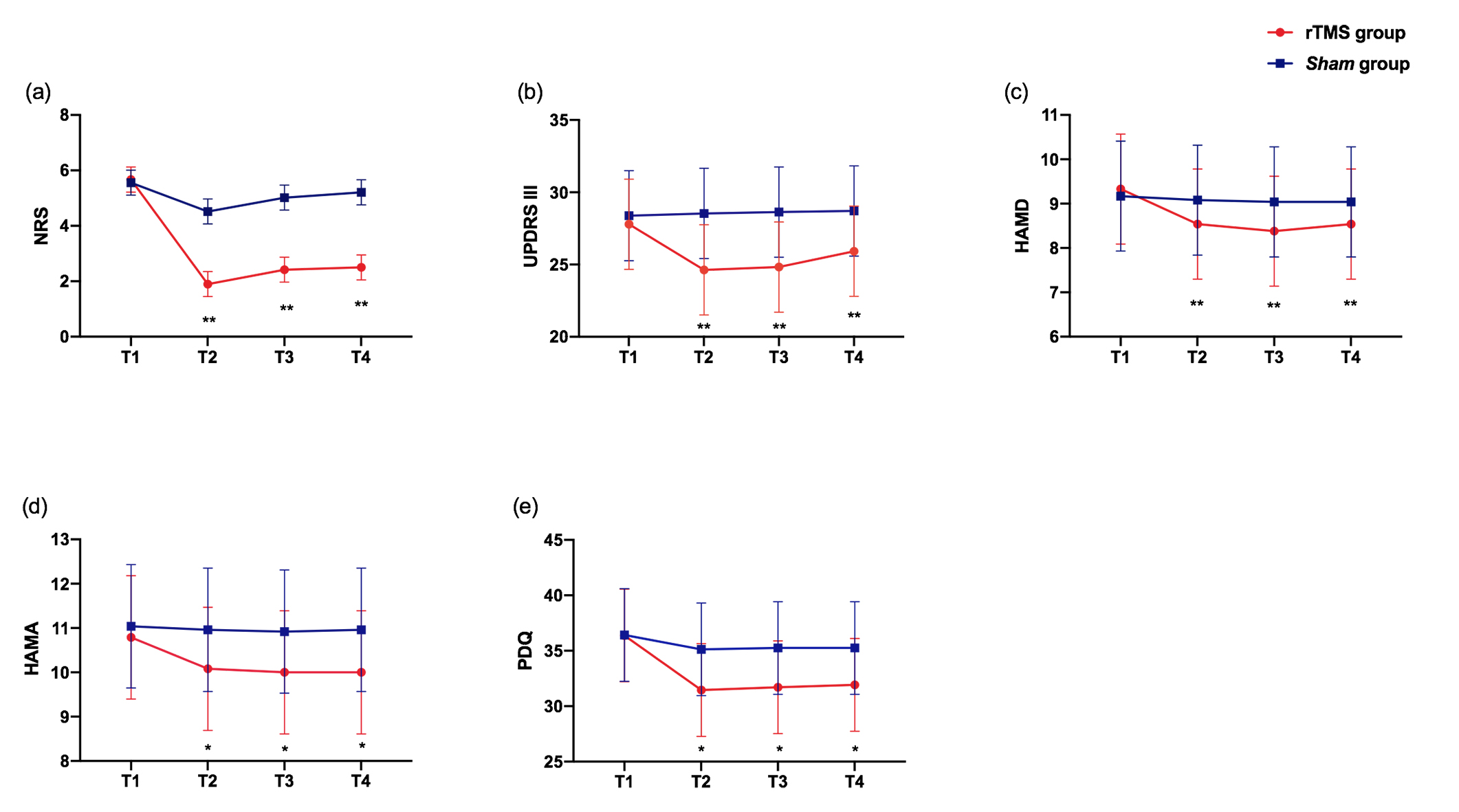Objective: To study the effects of high-frequency repetitive transcranial magnetic stimulation (rTMS) over primary motor cortex(M1) on musculoskeletal pain(MSP) in patients with Parkinson’s disease.
Background: Pain is one of the most common symptoms in Parkinson’s disease (PD). The incidence can increase to 68–85%1, 2. However, it is often under-recognized and inadequately treated compare to motor symptoms3, wherein MSP is one of the most common type. The prevalence of MSP ranges from 40% to 90% in PD patients experiencing pain 4,5. So far, there is no standardized treatment plan for MSP yet, as it does not sufficient respond to the medical and surgical treatments of PD6,7. Level A evidence has been reported to support the beneficial effects of high frequency rTMS over M1 for pain syndromes. Here we explored the first rTMS cohort study for PD patients with MSP.
Method: A group of 52 PD patients with musculoskeletal pain(MSP) were enrolled in a randomized, double-blind, sham-controlled trial. Patients were randomly allocated 1:1 to receive five sessions of either real (N=26) or sham (N=26) 20 Hz rTMS over M1. The patients were assessed at baseline (T0), after the the 5th (T1) sessions, and then 2 weeks (T2) and 4 weeks (T3) after the last session. The primary clinical outcome was the Numeric Rating Scale score (NRS), the secondary clinical outcome the Movement Disorder Society-Unified Parkinson’s Disease Rating Scale motor scores (MDS-UPDRS III and IV), Hamilton Depression Scale(HAMD), Hamilton Anxiety Scale (HAMA), the Scales for Outcomes in Parkinson’s disease–Autonomic Symptoms(SCOUP-AUT), Parkinson’s Disease Sleep Scale-2(PDSS-2), and Peyronie’s Disease Questionnaire (PDQ), assessed at T0, T1, T2, T3. All the assessments were carried out at the “ON” state.
Results: Each group had two patients withdrew. With a four weeks’ follow-up, there were significant interaction effects in the NRS (effect of group*time, p = 0.00), MDS-UPDRS III (p = 0.00), HAMD (p = 0.00), HAMA (p = 0.013), and PDQ (p = 0.00). Post-hoc analyses revealed a significantly decreased NRS score at T1 and T2, and significant improvements of MDS-UPDRS III, HAMD, HAMA, PDQ at T1, T2 in the rTMS group. No significant improvements were found in the sham group.
Conclusion: High-frequency rTMS over M1 may ultimately serve as an add-on therapy for alleviating MSP in PD.
References: 1. Beiske AG, Loge JH, Ronningen A, Svensson E. Pain in Parkinson’s disease: Prevalence and characteristics. Pain 2009;141:173-177. 2. Chaudhuri KR, Schapira AH. Non-motor symptoms of Parkinson’s disease: dopaminergic pathophysiology and treatment. The Lancet Neurology 2009;8:464-474. 3. Fil A, Cano-de-la-Cuerda R, Munoz-Hellin E, Vela L, Ramiro-Gonzalez M, Fernandez-de-Las-Penas C. Pain in Parkinson disease: a review of the literature. Parkinsonism & related disorders 2013;19:285-294; discussion 285. 4. Kim YE, Kim HJ, Yun JY, et al. Musculoskeletal Problems Affect the Quality of Life of Patients with Parkinson’s Disease. Journal of movement disorders 2018;11:133-138. 5. Wasner G, Deuschl G. Pains in Parkinson disease—many syndromes under one umbrella. Nature Reviews Neurology 2012;8:284-294. 6. Jung YJ, Kim HJ, Jeon BS, Park H, Lee WW, Paek SH. An 8-Year Follow-up on the Effect of Subthalamic Nucleus Deep Brain Stimulation on Pain in Parkinson Disease. JAMA Neurol 2015;72:504-510. 7. Jost WH, Buhmann C. The challenge of pain in the pharmacological management of Parkinson’s disease. Expert Opin Pharmacother 2019;20:1847-1854.
To cite this abstract in AMA style:
J. Li, T. Mi, W. Mao, J. Ma, P. Chan. High-frequency rTMS over the primary motor cortex relieves musculoskeletal pain in Parkinson’s disease: A randomized controlled trial [abstract]. Mov Disord. 2020; 35 (suppl 1). https://www.mdsabstracts.org/abstract/high-frequency-rtms-over-the-primary-motor-cortex-relieves-musculoskeletal-pain-in-parkinsons-disease-a-randomized-controlled-trial/. Accessed February 15, 2026.« Back to MDS Virtual Congress 2020
MDS Abstracts - https://www.mdsabstracts.org/abstract/high-frequency-rtms-over-the-primary-motor-cortex-relieves-musculoskeletal-pain-in-parkinsons-disease-a-randomized-controlled-trial/

